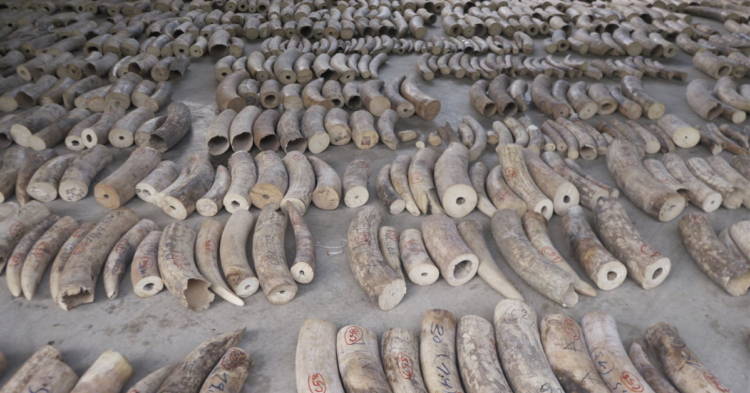In a win for those trying to cut into the global illegal wildlife trade, customs authorities in Singapore made a record seizure of elephant ivory and pangolin scales after smugglers tried to move the illicit goods through the city-state.
It’s not a record worldwide, but it’s the largest such bust in Singapore’s history.

In a statement, Singapore’s National Parks Board and Singapore Customs announced the massive haul, saying they had intercepted 8.8 tonnes (about 20,000 pounds) of elephant ivory and 11.9 tonnes (about 26,000 pounds) of pangolin scales.
Experts estimate that the ivory came from 300 African elephants and the scales from 2,000 giant pangolins.
Authorities say the shipment was headed to Vietnam from the Democratic Republic of Congo.

Thanks to a tip-off from China’s customs department, the ivory and scales were found spread among three containers marked as containing timber according to the bill of lading.
However, inspectors found only a token amount of timber hiding 237 sacks of pangolin scales and 132 sacks of ivory.
This latest seizure represents a continuing upswing in efforts to curb the illegal wildlife trade.

Singapore has long been a transit point in the illegal wildlife trade, according to conservation groups, but seizures have been taking place more frequently there, as well as in Hong Kong and Vietnam, in the past few months.
Since April, the tiny nation has seized 37.5 tonnes of pangolin scales.
In the latest seizure, authorities say the shipment had a value of $12.9 million in ivory and $35.7 million in scales.

“The seized pangolin scales and elephant ivory will be destroyed to prevent them from re-entering the market,” said Singapore’s Customs, Immigration and Checkpoints Authority and the National Parks Board.
Pangolins are particularly sought after in Southeast Asia both for their scales and their meat.

In Vietnam and China, pangolin meat is a delicacy, and its scales are used both for traditional medicine and for jewelry. As a result, pangolins are among the most heavily trafficked mammals in the world.
In their press release, the National Parks Board emphasized the need to reduce demand to cut down on the illegal wildlife trade.

“The loss of these Giant Pangolins and African Elephants, which are both classified by IUCN as Vulnerable, would have an adverse impact on their native ecosystems,” the wrote . “This is why Singapore does not condone illegal trade in CITES-listed species, including their parts and derivatives. We will continue to work with our fellow agencies to play our part in the global effort to tackle the illegal trade in wildlife.
“We can all help to reduce the demand by not buying wildlife parts and their products. With reduced demand, the illegal wildlife trade would be less lucrative for poachers.”
h/t: Reuters
















































